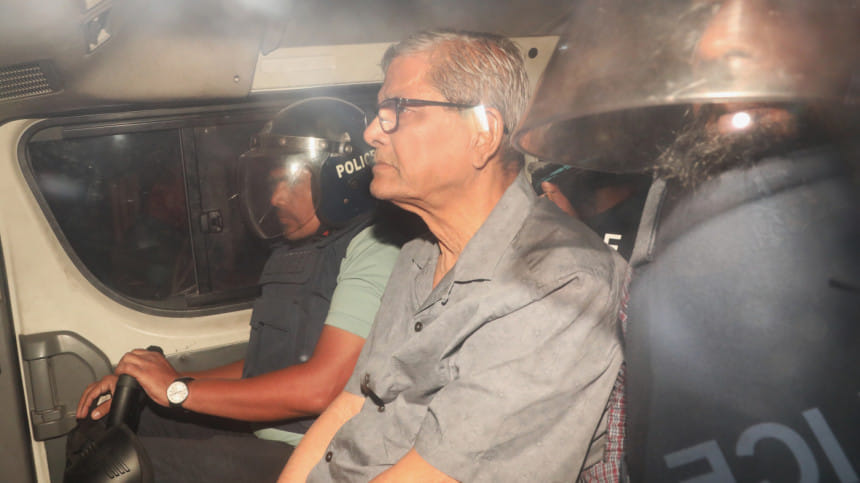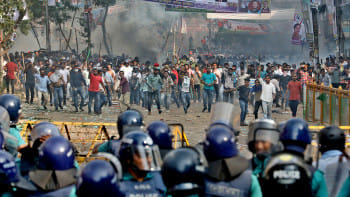Column by Mahfuz Anam: Towards a 'free and fair' election, indeed

When we, the voters, should have been looking around for suitable candidates to vote for and punish the previous ones who have let us down, we are instead passing our days in suspense and worry, and enduring each night in fear of plainclothes policemen (or their impersonators) barging into our homes and making us "disappear" because a friend or a relative at some point joined an opposition procession somewhere. And due to the opposition, we are being forced to either close down our offices, businesses, shops, factories, and schools, or operate them at the risk of being attacked at any time. We demand in the strongest of terms that our political leaders, from both sides, desist from their present politics and end our living in this unnerving state.
One after another, megaprojects—the Bangabandhu Tunnel, Terminal 3 of the Dhaka airport, the Padma Bridge Railway Link, the MRT Line-6, the Dhaka Elevated Expressway—are being inaugurated, making us extremely proud of our government's achievements. But before these accomplishments can sink into our minds, we are being traumatised by the political unrest which both the government and the opposition are responsible for; the former significantly more as it has taken no initiative to settle pre-existing issues before the latter took to the streets with its movement and consequent violence. This overwhelming sense of not knowing what's next is sapping us of the energy and hope that is crucially necessary to push the country forward.
Every day, experts, business leaders, bankers and thought leaders are warning us of our economy's fragile state. Consumers are being battered by high inflation, which touched 9.93 percent (point-to-point) in October, and with food inflation hitting a 12-year high at 12.54 percent. Exports earnings are dipping low, as are the value of taka and our foreign currency reserve.
Why are our leaders being irresponsible and turning a deaf ear to these dire predictions?
Our prime minister has repeated ad nauseam her determination to hold a free and fair election. But do her and her party's recent actions show that such is their aim? Is calling the opposition a "terrorist organisation" and its leaders all sorts of names, as well as using the most threatening language while referring to them, create an environment for a decent election?
According to our report on November 8, family members, drivers, assistants, and elderly relatives of any concealed person that police are looking for are also being arrested. Such actions cannot take place unless there is a total disregard for the law. Forget the fundamental legal tenet that one is innocent until proven guilty; the present practice is to punish anybody—children, spouses, elderly relatives, extended family members, friends, and paid assistants—in order to force the person the police are seeking to come out of hiding. This is a travesty of justice of the highest order.
According to BNP, 8,951 of its leaders and activists have been arrested across the country since October 28, 2023. According to Dhaka Metropolitan police (DMP), 1,636 BNP leaders and activists have been arrested and 112 cases have been filed against them in the 10 days after the same date. The figure is much higher when arrests made on the whole are considered.
Is it conceivable that we could have a free and fair election under these circumstances? With such government oppression and all-out efforts to destroy the biggest opposition party, what hope can there be of any election, let alone a free and fair one? Whatever distance already existed between the two political rivals, it has now been burdened further by a profound sense of anger, indignity, injustice, maltreatment and outright demonisation, destroying any chance—if there ever was any in the first place—of political rapprochement.
Then there is the question of how BNP leaders are treated once in jail. Since they are all arrested under specific charges—unlawful assembly, deterring police duty, damage to property, blasting explosives, and vandalism—they are treated like common criminals and not as political prisoners entitled to better treatment. Mirza Abbas, a very senior BNP leader and a former minister, claimed in court that he was forced to sleep on the floor of his cell along with all sorts of criminals.
According to Prothom Alo, the total number of prisoners in the country's 68 jails was around 77,000, based on a statement made in parliament by the home minister on September 22. However, as of November 7, there were 88,000 prisoners, making for twice the number that our prisons can hold. This sudden rise is mostly due to the imprisonment of BNP activists after their October 28 gathering. According to the rules, each prisoner is entitled to a six-feet-by-six-feet space as a basic right. Even this the jail authorities are currently unable to provide.
The specific case of Mirza Fakhrul Islam Alamgir, the secretary general of BNP (a very senior and highly respected politician), shows how laws are being used to punish politicians. He is 75 years old and suffers from many ailments, including cardiac issues. He was arrested on the morning of October 29 for the unlikely allegation of "attacking the residence of the chief justice." He moved for bail on November 2, and the learned judge fixed the date of hearing for November 20. Two things need to be pointed out here. Firstly, is it believable that a man of his stature would attack the house of the chief justice? Wouldn't that have attracted the attention of the respected judge? Secondly, by fixing the hearing date 18 days later, it was ensured that Fakhrul would serve a jail term of 18 days even before a word can be uttered about his fundamental rights. This is as clear a lesson as any for all who may contemplate joining any of the opposition rallies in the future.
Is it conceivable that we could have a free and fair election under these circumstances? With such government oppression and all-out efforts to destroy the biggest opposition party, what hope can there be of any election, let alone a free and fair one? Whatever distance already existed between the two political rivals, it has now been burdened further by a profound sense of anger, indignity, injustice, maltreatment and outright demonisation, destroying any chance—if there ever was any in the first place—of political rapprochement.
In the name of holding free and fair elections, the government has unleashed a policy of totally crushing BNP into smithereens. It has also initiated the discredited policy of creating factions and luring away some disgruntled elements to form a rival group, which will presumably toe the government's line.
So, what is going on is election engineering, not preparation for a free and fair election. A lot of money is at play, and the police and legal system are being used. The net result is that, instead of the public selecting our leaders through the exercise of their franchise, a set of preselected leaders will be forced upon us via all sorts of chicanery and manipulation. This would have been called a charade in any other country. But for us, this is how we fulfil our pledge to "uphold democracy at any cost."
Mahfuz Anam is the editor and publisher of The Daily Star.
Follow The Daily Star Opinion on Facebook for the latest opinions, commentaries and analyses by experts and professionals. To contribute your article or letter to The Daily Star Opinion, see our guidelines for submission.

 For all latest news, follow The Daily Star's Google News channel.
For all latest news, follow The Daily Star's Google News channel. 












Comments